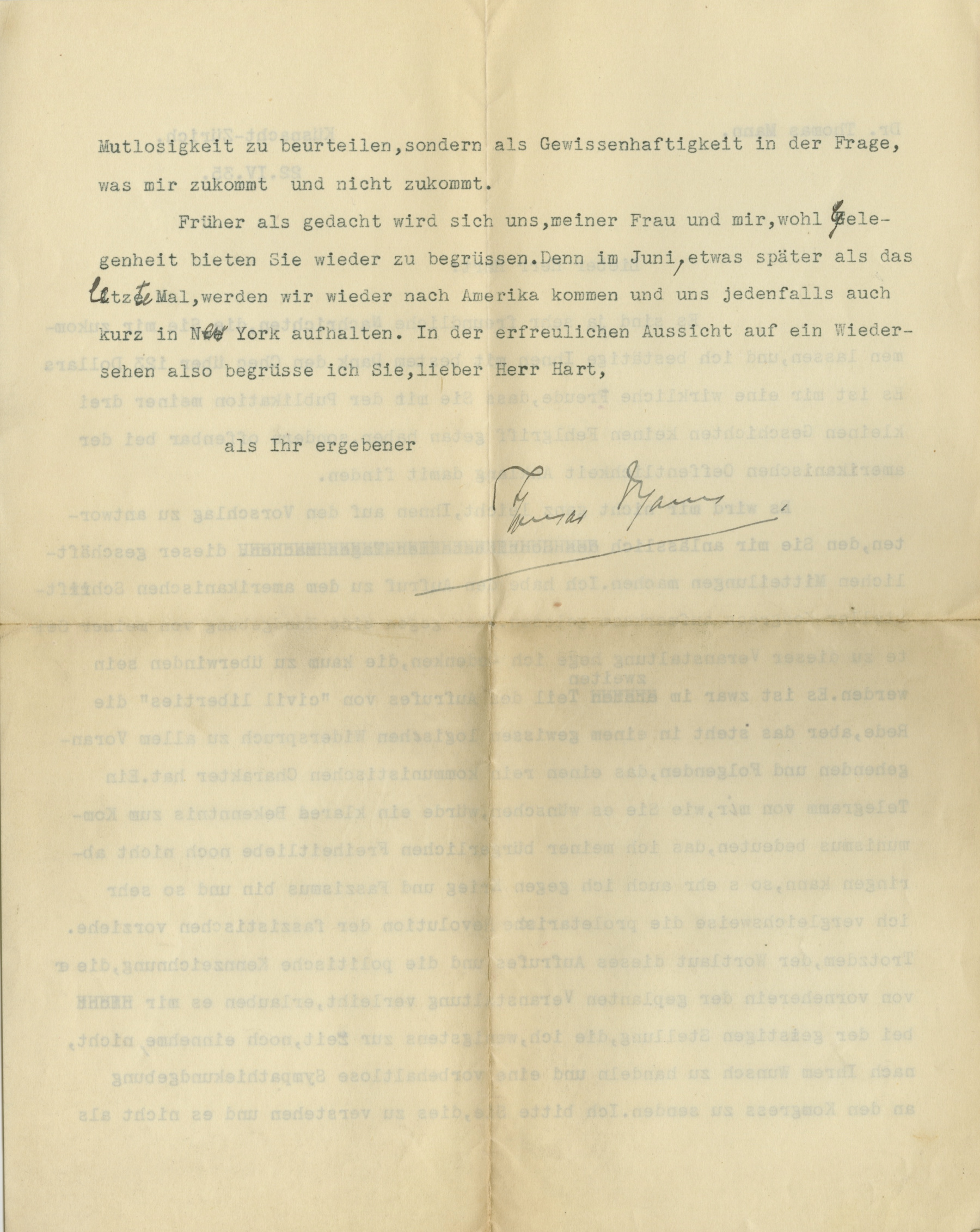Thomas Mann, In Exile from Nazi Germany, On His Decision Not to Endorse the Communist Declaration of the First American Writers Congress: “It is an act of good conscience, of what is my duty and what is not”


"I have a true love of civil liberties, as much as I am against fascism and war. I much prefer the communist revolution to that of the fascists. Nevertheless, the wording of this appeal... does not allow me to follow your wishes to send a note of unrestricted sympathy to the congress."
- Currency:
- USD
- GBP
- JPY
- EUR
- CNY
This letter was acquired from the family of the recipient and has never been offered for sale before
In 1900, at the age of 25, Thomas Mann wrote and in 1901 published Buddenbrooks, chronicling the decline of a wealthy north German merchant family over the course of four generations. Mann drew deeply...
This letter was acquired from the family of the recipient and has never been offered for sale before
In 1900, at the age of 25, Thomas Mann wrote and in 1901 published Buddenbrooks, chronicling the decline of a wealthy north German merchant family over the course of four generations. Mann drew deeply from the history of his own family, the Mann family of Lübeck, and their times. It was Mann’s first novel and it made him a major literary figure. The work led to a Nobel Prize in Literature for Mann in 1929; although the Nobel award generally recognizes an author’s body of work, the Swedish Academy’s citation for Mann identified “his great novel Buddenbrooks” as the principal reason for his prize. Mann began writing the book in October 1897, when he was twenty-two years old.
Henry Hart was an American publisher who worked mainly for Scribner’s in New York. He was working with Mann on the publication of English-language versions of his works, including Nocturns.
The League of American Writers was established by the First American Writers Congress, a gathering held from April 26–28, 1935. It was an association of American novelists, playwrights, poets, journalists, and literary critics launched by the Communist Party USA in 1935. The group included Communist Party members, and so-called “fellow travelers” who closely followed the Communist Party’s political line without being formal party members, as well as individuals sympathetic to specific policies being advocated by the parrty.
In 1933, after the takeover of the Nazi party, while travelling in the South of France, Mann heard from his eldest children Klaus and Erika in Munich, that it would not be safe for him to return to Germany. The family (except these two children) emigrated to Küsnacht, near Zürich, Switzerland, but received Czechoslovak citizenship and a passport in 1936.
Typed letter signed, April 22, 1935, to Hart, his publisher. “It is not easy for me to answer your suggestion in regards to this business news. I have read very carefully the appeal of the American writer’s congress. However, I have unsurmountable concerns about contributing a statement to the congress. In the second half of the appeal there is mention of ‘civil liberties’. It stands in logical contradiction to all previous statements, which have a purely communist character. A telegram on my part, as you have asked me to send, would be a clear support of communism, which I am not able to force myself to give. I have a true love of civil liberties, as much as I am against fascism and war. I much prefer the communist revolution to that of the fascists. Nevertheless, the wording of this appeal and the political orientation it lends to this congress does not allow me to follow your wishes to send a note of unrestricted sympathy to the congress. I beg you to understand and not interpret my position as a lack of courage. It is an act of good conscience, of what is my duty and what is not.
“Earlier than planned, my wife and I will have the opportunity to see you again. In June, a little bit later than last time, we will come to America and stay for a short while in New York.”
This letter was acquired from the family of the recipient and has never before been offered for sale.

Frame, Display, Preserve
Each frame is custom constructed, using only proper museum archival materials. This includes:The finest frames, tailored to match the document you have chosen. These can period style, antiqued, gilded, wood, etc. Fabric mats, including silk and satin, as well as museum mat board with hand painted bevels. Attachment of the document to the matting to ensure its protection. This "hinging" is done according to archival standards. Protective "glass," or Tru Vue Optium Acrylic glazing, which is shatter resistant, 99% UV protective, and anti-reflective. You benefit from our decades of experience in designing and creating beautiful, compelling, and protective framed historical documents.
Learn more about our Framing Services









































































































